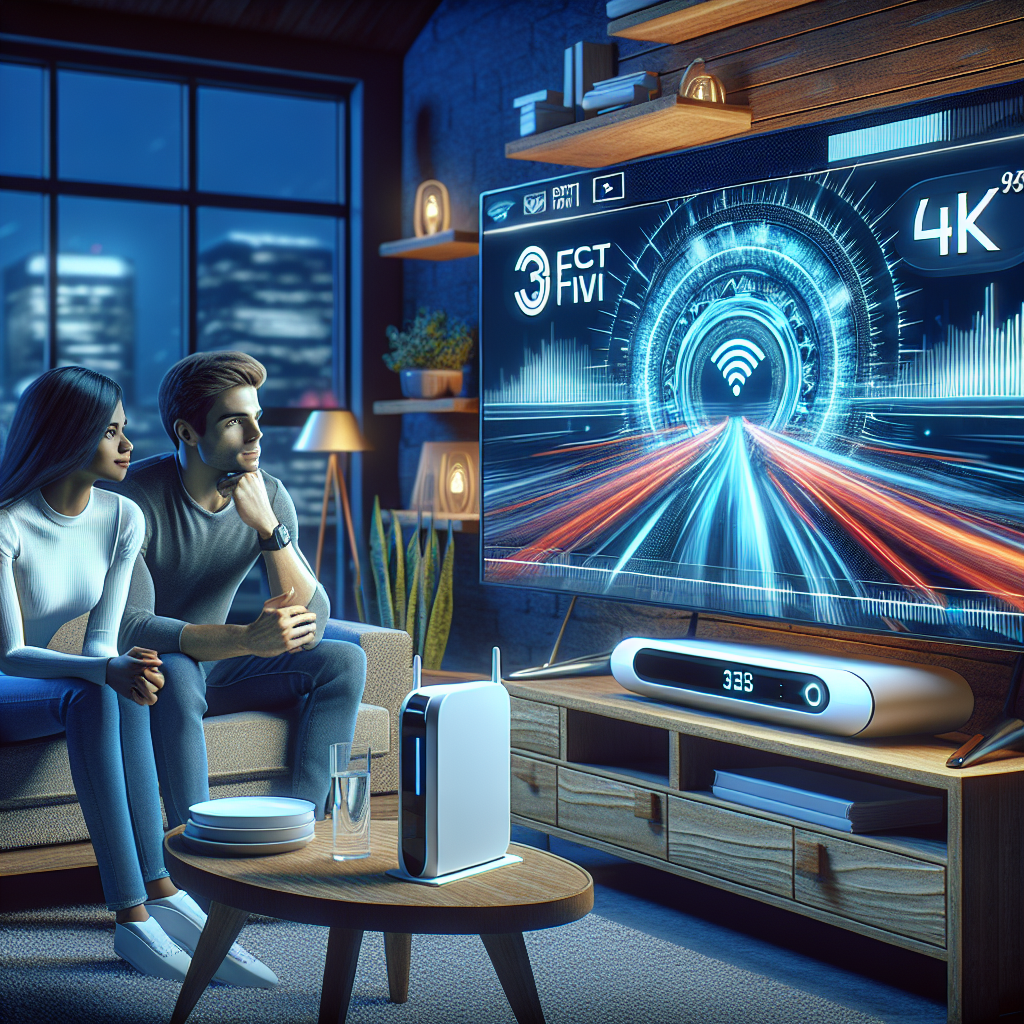In today’s digital age, video streaming has become a popular form of entertainment. However, to fully enjoy a seamless and uninterrupted viewing experience, having the right internet speed is crucial. From Netflix to YouTube and everything in between, finding the best internet speed for video streaming is key to avoiding buffering and low-quality playback. In this article, we will explore the ideal internet speed required for smooth video streaming, whether you’re watching your favorite TV show or catching up on the latest movies. Get ready to optimize your streaming experience and say goodbye to frustrating interruptions!
Understanding Internet Speeds

Internet speed refers to the rate at which data is transferred from the internet to a device and vice versa. It is typically measured in megabits per second (Mbps) and determines how quickly content can be downloaded or streamed online.
Definition of Internet Speed
- Bandwidth: The maximum rate at which data can be transferred over a network connection.
- Download Speed: The speed at which data is transferred from the internet to the user’s device.
- Upload Speed: The speed at which data is transferred from the user’s device to the internet.
Factors Affecting Internet Speed
- Connection Type: Whether it’s a wired (Ethernet) or wireless (Wi-Fi) connection.
- Network Congestion: The more users on a network, the slower the speeds may be.
- Internet Service Provider (ISP): Different providers offer varying speeds based on their infrastructure.
- Distance from Server: Proximity to the server hosting the content can affect speed.
Importance of Internet Speed for Video Streaming
- Buffering: Insufficient speed leads to buffering, causing interruptions in video playback.
- Resolution: Higher quality video requires faster speeds to stream without lag or pixelation.
- Multiple Devices: Faster speeds accommodate simultaneous streaming on multiple devices without quality degradation.
Recommended Internet Speeds for Different Video Qualities
Standard Definition (SD)
Recommended Internet Speeds for Different Video Qualities
When it comes to streaming videos in standard definition (SD), it’s important to consider the minimum internet speed required to avoid buffering and interruptions.
-
Minimum internet speed required: Typically, a minimum internet speed of 3 Mbps is recommended for streaming SD content. This speed should be sufficient to stream videos without experiencing constant buffering or lag.
-
Recommended internet speed for optimal viewing experience: For a smoother and more reliable streaming experience in SD quality, it is advisable to have an internet speed of at least 5 Mbps. This speed allows for better video quality and reduces the likelihood of interruptions during playback.
In conclusion, while it is possible to stream SD content with a minimum internet speed of 3 Mbps, aiming for a speed of 5 Mbps or higher can significantly enhance the viewing experience by providing smoother playback and better video quality.
High Definition (HD)
-
Minimum internet speed required:
To stream videos in high definition (HD), a minimum internet speed of at least 5 megabits per second (Mbps) is recommended. This speed allows for smooth playback without constant buffering interruptions. -
Recommended internet speed for optimal viewing experience:
For an optimal viewing experience in HD quality, it is advised to have a higher internet speed of around 10 Mbps or more. This speed ensures that the video streams in high definition without any lagging or loss of quality, particularly for streaming services that offer HD content at 1080p resolution.
Ultra High Definition (UHD) or 4K
-
Minimum internet speed required: To stream content in Ultra High Definition (UHD) or 4K quality, a minimum internet speed of at least 25 Mbps is recommended. This speed ensures that the video can be streamed without buffering or interruptions due to insufficient bandwidth.
-
Recommended internet speed for optimal viewing experience: For an optimal viewing experience in UHD or 4K quality, a higher internet speed is recommended. A speed of around 50 Mbps or higher is ideal for streaming high-resolution content smoothly and without any degradation in quality. This higher speed allows for faster loading times, better clarity, and overall enhanced viewing experience, especially for fast-paced action scenes or detailed visuals found in 4K content.

Impact of Internet Speed on Video Streaming Experience
- Buffering issues
- Insufficient internet speed often leads to buffering problems while streaming videos online. This occurs when the data being received is slower than the playback speed, causing the video to pause intermittently to buffer more content.
- Buffering can be frustrating for users as it disrupts the viewing experience and can result in a loss of interest in the content being watched.
-
To avoid buffering, it is recommended to have a stable internet connection with sufficient speed to support uninterrupted streaming.
-
Video quality fluctuations
- Inadequate internet speed can also cause fluctuations in video quality during streaming. When the connection speed is not high enough, the streaming service may automatically adjust the video resolution to a lower quality to ensure smooth playback.
- This downgrade in video quality can result in a pixelated or blurry image, reducing the overall viewing experience for the audience.
-
To enjoy high-definition video streaming without interruptions or quality degradation, a faster internet connection is necessary to support the transmission of higher-quality content.
-
Lag and latency
- Slow internet speed can lead to lag and latency issues while streaming videos, causing a delay between the user’s actions and the response from the streaming service.
- Lag can manifest as delays in video playback, unresponsive controls, or a lack of synchronization between audio and video.
- To minimize lag and latency during video streaming, a fast and stable internet connection is essential to ensure real-time interaction with the content without any delays.
Tips for Improving Internet Speed for Video Streaming
In the realm of video streaming, having a fast and reliable internet connection is paramount to ensure a seamless viewing experience. Here are some tips to enhance your internet speed for optimal video streaming performance:
- Upgrading Internet Plan
When it comes to video streaming, the speed of your internet connection plays a crucial role in determining the quality of the viewing experience. Consider upgrading your internet plan to a higher speed tier offered by your service provider. Higher bandwidth can support smoother streaming without buffering interruptions.
- Using Wired Connection
While Wi-Fi offers convenience, a wired connection can often provide a more stable and faster internet connection for video streaming. Connecting your device directly to the router via an Ethernet cable can minimize interference and signal loss, resulting in improved streaming speeds and reduced latency.
- Limiting the Number of Connected Devices
The more devices connected to your network, the more bandwidth is divided among them, potentially slowing down your internet speed for video streaming. To optimize streaming performance, limit the number of devices connected simultaneously, especially during peak streaming times.
- Positioning the Router Strategically
The placement of your router can significantly impact the strength and speed of your internet connection. Position the router in a centralized location within your home to ensure maximum coverage and signal strength. Avoid placing the router near electronic devices or obstructions that could interfere with the Wi-Fi signal and hamper streaming speeds.

By implementing these tips and optimizing your internet connection for video streaming, you can enjoy a seamless and high-quality viewing experience without disruptions or buffering delays.
Common Misconceptions about Internet Speed for Video Streaming
Myth: Higher internet speed always equals better streaming quality
- The belief that faster internet automatically guarantees superior streaming quality is a misconception that overlooks other crucial factors.
- While higher internet speeds can indeed facilitate smoother streaming experiences, they are not the sole determinant of video quality.
- Factors such as network congestion, device capabilities, and the streaming platform’s servers play significant roles in determining the overall streaming quality.
Myth: Any internet speed can support video streaming
- Contrary to popular belief, not all internet speeds are capable of supporting seamless video streaming.
- While lower internet speeds may allow for video playback, they often result in buffering, pixelation, and overall poor viewing experiences.
- To enjoy high-definition streaming without interruptions, a minimum internet speed threshold is necessary, which varies depending on the streaming platform and the desired video quality.
Myth: Internet speed is the only factor affecting video streaming quality
- Video streaming quality is influenced by a combination of factors beyond just internet speed.
- The device used for streaming, its processing power, the quality of the video source, and the efficiency of the streaming platform all contribute to the overall viewing experience.
- Ignoring these additional factors and solely focusing on internet speed can lead to subpar streaming quality even with a fast connection.
FAQs: Exploring the Best Internet Speed for Video Streaming
What is the recommended internet speed for streaming video in HD?
For streaming video in HD quality, it is generally recommended to have a minimum internet speed of at least 5 Mbps. This should provide a smooth viewing experience with minimal buffering or lagging. However, if you want to stream in 4K or UHD quality, a faster internet speed of around 25 Mbps or higher is recommended to ensure crystal-clear visuals.
How does the number of devices connected to the internet affect video streaming quality?
The number of devices connected to your internet network can impact the quality of your video streaming experience. Each additional device using the internet will take up bandwidth, potentially causing slower speeds and buffering while streaming videos. To ensure smooth streaming, it is advisable to limit the number of devices using the internet simultaneously, especially when streaming content in high definition.
Can I stream video smoothly with a slower internet speed?
While it is possible to stream video with slower internet speeds, the quality of the streaming experience may be compromised. With slower internet speeds, you may experience more buffering, lower video resolution, and potential interruptions in the stream. To maximize your viewing experience, it is recommended to have a faster internet connection with sufficient bandwidth for smooth video streaming.
What can I do to improve my internet speed for better video streaming quality?
There are several steps you can take to improve your internet speed for better video streaming quality. One option is to upgrade your internet plan to a faster speed tier offered by your service provider. Additionally, you can optimize your home network by placing your router in a central location, reducing interference from other electronic devices, and using a wired connection for streaming devices when possible. Regularly resetting your modem and router and closing unnecessary background applications on your devices can also help improve internet speed for video streaming.